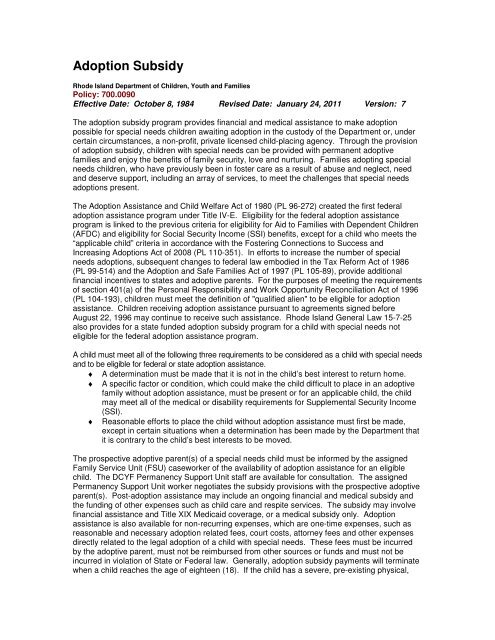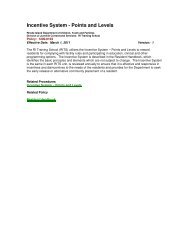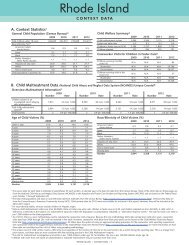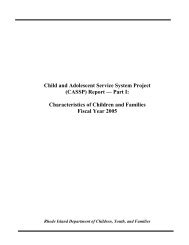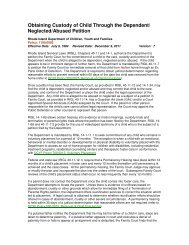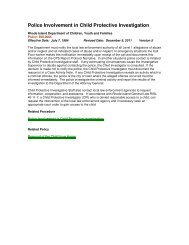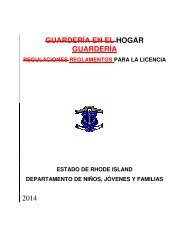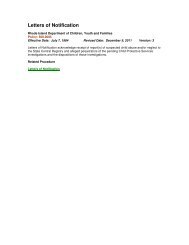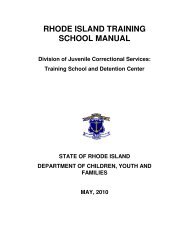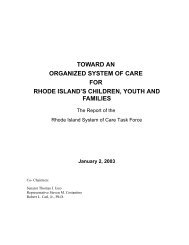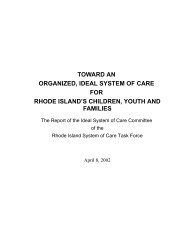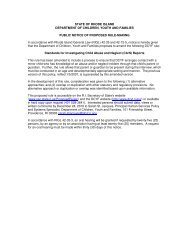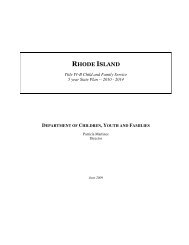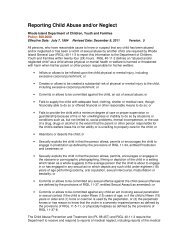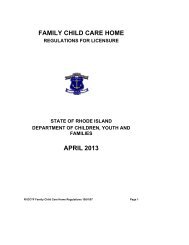Adoption Subsidy - RI Department of Children, Youth & Families
Adoption Subsidy - RI Department of Children, Youth & Families
Adoption Subsidy - RI Department of Children, Youth & Families
You also want an ePaper? Increase the reach of your titles
YUMPU automatically turns print PDFs into web optimized ePapers that Google loves.
<strong>Adoption</strong> <strong>Subsidy</strong><br />
Rhode Island <strong>Department</strong> <strong>of</strong> <strong>Children</strong>, <strong>Youth</strong> and <strong>Families</strong><br />
Policy: 700.0090<br />
Effective Date: October 8, 1984 Revised Date: January 24, 2011 Version: 7<br />
The adoption subsidy program provides financial and medical assistance to make adoption<br />
possible for special needs children awaiting adoption in the custody <strong>of</strong> the <strong>Department</strong> or, under<br />
certain circumstances, a non-pr<strong>of</strong>it, private licensed child-placing agency. Through the provision<br />
<strong>of</strong> adoption subsidy, children with special needs can be provided with permanent adoptive<br />
families and enjoy the benefits <strong>of</strong> family security, love and nurturing. <strong>Families</strong> adopting special<br />
needs children, who have previously been in foster care as a result <strong>of</strong> abuse and neglect, need<br />
and deserve support, including an array <strong>of</strong> services, to meet the challenges that special needs<br />
adoptions present.<br />
The <strong>Adoption</strong> Assistance and Child Welfare Act <strong>of</strong> 1980 (PL 96-272) created the first federal<br />
adoption assistance program under Title IV-E. Eligibility for the federal adoption assistance<br />
program is linked to the previous criteria for eligibility for Aid to <strong>Families</strong> with Dependent <strong>Children</strong><br />
(AFDC) and eligibility for Social Security Income (SSI) benefits, except for a child who meets the<br />
“applicable child” criteria in accordance with the Fostering Connections to Success and<br />
Increasing <strong>Adoption</strong>s Act <strong>of</strong> 2008 (PL 110-351). In efforts to increase the number <strong>of</strong> special<br />
needs adoptions, subsequent changes to federal law embodied in the Tax Reform Act <strong>of</strong> 1986<br />
(PL 99-514) and the <strong>Adoption</strong> and Safe <strong>Families</strong> Act <strong>of</strong> 1997 (PL 105-89), provide additional<br />
financial incentives to states and adoptive parents. For the purposes <strong>of</strong> meeting the requirements<br />
<strong>of</strong> section 401(a) <strong>of</strong> the Personal Responsibility and Work Opportunity Reconciliation Act <strong>of</strong> 1996<br />
(PL 104-193), children must meet the definition <strong>of</strong> "qualified alien" to be eligible for adoption<br />
assistance. <strong>Children</strong> receiving adoption assistance pursuant to agreements signed before<br />
August 22, 1996 may continue to receive such assistance. Rhode Island General Law 15-7-25<br />
also provides for a state funded adoption subsidy program for a child with special needs not<br />
eligible for the federal adoption assistance program.<br />
A child must meet all <strong>of</strong> the following three requirements to be considered as a child with special needs<br />
and to be eligible for federal or state adoption assistance.<br />
♦ A determination must be made that it is not in the child’s best interest to return home.<br />
♦ A specific factor or condition, which could make the child difficult to place in an adoptive<br />
family without adoption assistance, must be present or for an applicable child, the child<br />
may meet all <strong>of</strong> the medical or disability requirements for Supplemental Security Income<br />
(SSI).<br />
♦ Reasonable efforts to place the child without adoption assistance must first be made,<br />
except in certain situations when a determination has been made by the <strong>Department</strong> that<br />
it is contrary to the child’s best interests to be moved.<br />
The prospective adoptive parent(s) <strong>of</strong> a special needs child must be informed by the assigned<br />
Family Service Unit (FSU) caseworker <strong>of</strong> the availability <strong>of</strong> adoption assistance for an eligible<br />
child. The DCYF Permanency Support Unit staff are available for consultation. The assigned<br />
Permanency Support Unit worker negotiates the subsidy provisions with the prospective adoptive<br />
parent(s). Post-adoption assistance may include an ongoing financial and medical subsidy and<br />
the funding <strong>of</strong> other expenses such as child care and respite services. The subsidy may involve<br />
financial assistance and Title XIX Medicaid coverage, or a medical subsidy only. <strong>Adoption</strong><br />
assistance is also available for non-recurring expenses, which are one-time expenses, such as<br />
reasonable and necessary adoption related fees, court costs, attorney fees and other expenses<br />
directly related to the legal adoption <strong>of</strong> a child with special needs. These fees must be incurred<br />
by the adoptive parent, must not be reimbursed from other sources or funds and must not be<br />
incurred in violation <strong>of</strong> State or Federal law. Generally, adoption subsidy payments will terminate<br />
when a child reaches the age <strong>of</strong> eighteen (18). If the child has a severe, pre-existing physical,
mental or emotional disability or physical condition which is unlikely to change, the adoption<br />
assistance may be provided until the child is twenty-one (21) years <strong>of</strong> age.<br />
The adoption subsidy is intended to supplement the resources <strong>of</strong> the adoptive family and the<br />
community and cannot exceed the amount the child would receive if he or she was residing in a<br />
<strong>Department</strong> foster home. The amount <strong>of</strong> the adoption assistance payment is determined through<br />
the discussion and negotiation process between the adoptive parent(s) and a representative <strong>of</strong><br />
the <strong>Department</strong> based upon the needs <strong>of</strong> the child and the circumstances <strong>of</strong> the family. The<br />
payment that is agreed upon should combine with the resources <strong>of</strong> the parents to cover the<br />
ordinary and special needs <strong>of</strong> the child and other anticipated needs such as child care or respite.<br />
Anticipation and discussion <strong>of</strong> these needs are part <strong>of</strong> the negotiation <strong>of</strong> the amount <strong>of</strong> the<br />
adoption assistance payment. The terms <strong>of</strong> the adoption assistance agreement must be<br />
negotiated and agreed upon by the <strong>Department</strong> and the prospective adoptive parent(s) prior to<br />
the finalization <strong>of</strong> the adoption. A special needs child eligible for an adoption subsidy in Rhode<br />
Island will continue to receive a subsidy if the adoptive family moves to another state after the<br />
adoption is finalized.<br />
The adoption assistance agreement must be recertified every two (2) years through the<br />
Permanency Support Unit. At any time during the life <strong>of</strong> the agreement, either the <strong>Department</strong> or<br />
the adoptive parent(s) may request an adjustment in the adoption subsidy payment. Some<br />
situations that may justify an adjustment to the adoption subsidy payment include: changes in the<br />
federal benefits, a change in the child’s needs or the adoptive family’s situation, the placement <strong>of</strong><br />
the child in out <strong>of</strong> home care, the lack <strong>of</strong> availability <strong>of</strong> a program or a shortage <strong>of</strong> state or federal<br />
funds. It is the responsibility <strong>of</strong> the adoptive parent(s) to inform the Permanency Support Unit <strong>of</strong><br />
any changes in circumstances that may affect the adoption subsidy payment, including address<br />
changes and notification if the adoptive parent(s) is no longer supporting the child. If the<br />
<strong>Department</strong> denies the adoptive parent’s request for an increase in adoption subsidy or revokes,<br />
suspends, reduces, changes or terminates a subsidy payment or service, the adoptive parent has<br />
the right to request a fair hearing in accordance with DCYF Policy 100.0055 Complaints and<br />
Hearings.<br />
The subsidy agreement represents the total contract between the adoptive parent(s) and the<br />
<strong>Department</strong>. If an adoptive parent has questions about the subsidy, the Permanency Support<br />
Unit is available to help the family, including assisting with referrals for community services.<br />
Related Procedures<br />
Eligibility for <strong>Adoption</strong> Assistance/<strong>Subsidy</strong><br />
Types <strong>of</strong> <strong>Adoption</strong> Assistance/<strong>Subsidy</strong><br />
<strong>Adoption</strong> Assistance Application and Approval Process<br />
Recertification, Adjustment and Termination <strong>of</strong> <strong>Adoption</strong> Assistance<br />
Related Policies<br />
<strong>Adoption</strong><br />
Complaints and Hearings<br />
Social Security Benefits - SSA<br />
Social Security Benefits - SSI<br />
VA Benefits<br />
<strong>RI</strong> DCYF <strong>Adoption</strong> <strong>Subsidy</strong> 2 1/24/2011
Eligibility for <strong>Adoption</strong> Assistance/<strong>Subsidy</strong><br />
Procedure from Policy 700.0090: <strong>Adoption</strong> <strong>Subsidy</strong><br />
A. Identification <strong>of</strong> Special Needs - A child is considered to have special needs and to be<br />
eligible for federal or state adoption assistance if the child meets all <strong>of</strong> the following three<br />
(3) criteria:<br />
1. A determination has been made that the child cannot or should not be returned to<br />
the parent’s home.<br />
2. A specific factor or condition, which could make the child difficult to place in an<br />
adoptive family without adoption assistance, must be present or for an applicable<br />
child, the child may meet all <strong>of</strong> the medical or disability requirements for SSI.<br />
Worker must document the specific factor that makes a child difficult to place.<br />
This may require written documentation from medical, mental health, educational<br />
or other pr<strong>of</strong>essional. Such factors include:<br />
a. The child has a documented medical condition or a physical, emotional,<br />
or mental disability.<br />
b. The child is a member <strong>of</strong> an ethnic or racial minority.<br />
c. The child is over the age <strong>of</strong> nine (9).<br />
d. The child is a member <strong>of</strong> a sibling group being adopted into the same<br />
home as a sibling.<br />
e. The child has experienced a prior adoption disruption or dissolution.<br />
f. The child is at high risk <strong>of</strong> developing a medical condition or a physical,<br />
emotional or mental disability, based upon family background or history.<br />
(In this situation, a child may be eligible for deferred subsidy, which<br />
would include a medical subsidy without financial assistance. In the<br />
event a disability, based upon family background or history, is diagnosed<br />
in the future, the child may then be eligible to receive financial<br />
assistance.)<br />
3. Reasonable efforts have been made without success to locate an adoptive home<br />
which does not require a subsidy.<br />
a. Worker must document reasonable efforts to place a child without<br />
subsidy. Such efforts include registering child with adoption exchanges,<br />
such as <strong>Adoption</strong> <strong>RI</strong>, and asking the adoptive parent(s) if they are willing<br />
to adopt without a subsidy.<br />
b. The only exception is if the <strong>Department</strong> determines that it is in the child’s<br />
best interest to be adopted by a relative caretaker or foster care family<br />
who could not afford to adopt the child without subsidy (e.g., the child<br />
has resided in the home for a significant period <strong>of</strong> time and a significant<br />
parent/child relationship exists).<br />
B. Title IV-E Eligibility for a Non-Applicable Child<br />
1. Eligibility for Title IV-E <strong>Adoption</strong> Assistance exists when any <strong>of</strong> the following<br />
apply and the child meets the definition <strong>of</strong> "special needs" (Refer to Section A<br />
above).<br />
a. Child was eligible for Title IV-E at the time <strong>of</strong> initial placement, or would<br />
have been AFDC eligible and met all other eligibility criteria if application<br />
had been made.<br />
b. Child is deemed SSI eligible before the legal finalization <strong>of</strong> the adoption.<br />
c. Child is eligible as the child <strong>of</strong> a minor parent if the child meets all federal<br />
requirements.<br />
d. Child is eligible due to prior IV-E adoption assistance eligibility.<br />
2. A Title IV-E Eligibility Technician will determine if a child is eligible for the<br />
federally funded Title IV-E <strong>Adoption</strong> Assistance Program. A child who is not<br />
eligible for federal funds may be eligible for a state-funded subsidy.<br />
<strong>RI</strong> DCYF <strong>Adoption</strong> <strong>Subsidy</strong> 3 1/24/2011
C. Title IV-E Eligibility for an Applicable Child<br />
1. Eligibility for Title IV-E <strong>Adoption</strong> Assistance as an applicable child exists when<br />
any <strong>of</strong> the following apply and the child meets the definition <strong>of</strong> "special needs"<br />
(Refer to section A above).<br />
a. Child meets the applicable age requirements.<br />
i. The applicable age for a child begins at fourteen (14) years old in<br />
FFY 2011 and decreases by two (2) years for each fiscal year<br />
until a child <strong>of</strong> any age meets the applicable age requirements in<br />
FFY 2018.<br />
ii. The child meets the requirements based on age if the child<br />
attains the applicable age anytime before the end <strong>of</strong> the fiscal<br />
year during which the adoption assistance agreement was<br />
iii.<br />
entered into.<br />
Beginning October 1, 2017, the applicable child eligibility criteria<br />
will apply to children <strong>of</strong> all ages.<br />
b. Child has been in foster care for at least sixty (60) consecutive months.<br />
c. Child is a sibling <strong>of</strong> an applicable child by virtue <strong>of</strong> age or time in foster<br />
care and is placed in the same adoption arrangement as his or her<br />
sibling.<br />
2. An applicable child with special needs must also meet one <strong>of</strong> the four (4)<br />
following eligibility requirements.<br />
a. The child, at the time <strong>of</strong> the initiation <strong>of</strong> adoption proceedings, was in the<br />
care <strong>of</strong> DCYF or licensed private child placement agency pursuant to:<br />
i. An involuntary removal in accordance with a judicial determination<br />
to the effect that it was contrary to the child’s welfare to remain in<br />
the home; or<br />
ii.<br />
Child was placed through a voluntary agreement or voluntarily<br />
relinquished.<br />
b. The child meets all medical and disability requirements <strong>of</strong> Title XVI with<br />
respect to eligibility for SSI benefits. An applicable child does not have<br />
to meet the needs-based requirements for SSI.<br />
c. The child was residing in a foster family home or child care institution<br />
with his/her minor parent and the minor parent was removed from home<br />
pursuant to either:<br />
i. An involuntary removal in accordance with a judicial determination<br />
to the effect that it was contrary to the child’s welfare to remain in<br />
the home; or<br />
ii. A voluntary placement agreement or voluntary relinquishment.<br />
d. The child was adopted and was determined eligible for Title IV-E<br />
adoption assistance in a prior adoption (or would have been found<br />
eligible had the <strong>Adoption</strong> and Safe <strong>Families</strong> Act <strong>of</strong> 1997 been in effect at<br />
the time <strong>of</strong> the previous adoption), and is available for adoption because<br />
the prior adoption has been dissolved or the child’s adoptive parents<br />
have died.<br />
i. In such an instance the child may retain eligibility for adoption<br />
assistance payments in a subsequent adoption.<br />
ii.<br />
The child must continue to meet the definition <strong>of</strong> a child with “special<br />
needs” (refer to Section A above).<br />
3. No payment (including non-recurring expenses) may be made to parents with<br />
respect to any applicable child for a fiscal year that the child:<br />
a. Is not a citizen or resident <strong>of</strong> the United States.<br />
b. Was adopted outside <strong>of</strong> the United States or was brought into the United<br />
States for the purpose <strong>of</strong> being adopted.<br />
4. A child that is not a citizen or resident <strong>of</strong> the United States and was adopted<br />
outside <strong>of</strong> the United States or brought into the United States for the purpose <strong>of</strong><br />
being adopted may be eligible for adoption assistance payments if the initial<br />
<strong>RI</strong> DCYF <strong>Adoption</strong> <strong>Subsidy</strong> 4 1/24/2011
adoption <strong>of</strong> the child by parents is a failure and the child is subsequently placed<br />
into foster care.<br />
D. Eligibility for <strong>Subsidy</strong> until Age Twenty-one (21)<br />
1. A child is generally eligible for adoption subsidy until he or she reaches the age<br />
<strong>of</strong> eighteen (18).<br />
2. A child with a severe, pre-existing physical, emotional or mental disability or<br />
physical condition that is unlikely to change may be eligible to receive adoption<br />
subsidy payments until age twenty-one (21).<br />
a. Worker must obtain documentation <strong>of</strong> severe physical, emotional or<br />
mental disability or physical condition.<br />
b. Documentation must be submitted for administrative review and approval<br />
with the request for adoption subsidy.<br />
E. Inter-jurisdictional <strong>Adoption</strong>s<br />
1. If a child in the custody <strong>of</strong> the <strong>Department</strong> is placed for adoption with a family in<br />
another state, it is the responsibility <strong>of</strong> the <strong>Department</strong> to process and fund the<br />
adoption subsidy. If a needed service specified in the agreement is not available<br />
in the new state <strong>of</strong> residence, the <strong>Department</strong> remains financially responsible to<br />
provide that service.<br />
2. If a child is eligible for IV-E <strong>Adoption</strong> Assistance and moves out <strong>of</strong> state, the child<br />
will continue to receive a financial subsidy through <strong>RI</strong>, but is eligible to receive<br />
Federal Medicaid in the new state <strong>of</strong> residence.<br />
3. If a child is receiving a state funded subsidy and moves out <strong>of</strong> state, the child will<br />
continue to receive a state funded financial subsidy and may qualify for Medicaid<br />
coverage in the new state <strong>of</strong> residence if the state participates in the COBRA<br />
Option and exercises reciprocity. If not, the child will continue to receive a<br />
medical subsidy funded by Rhode Island at <strong>RI</strong>’s Medical Assistance rates.<br />
a. The Cobra Option (or State Option) was established by the Consolidated<br />
Omnibus Reconciliation Act <strong>of</strong> 1986 and provides for states to have the<br />
option to include non-IVE eligible children in their Medicaid programs.<br />
b. Reciprocity refers to states that are Cobra or State Option states that<br />
also agree to include in their Medicaid program children on subsidy from<br />
other states, for whom they are now the resident state, and who are not<br />
IVE eligible.<br />
<strong>RI</strong> DCYF <strong>Adoption</strong> <strong>Subsidy</strong> 5 1/24/2011
Types <strong>of</strong> <strong>Adoption</strong> Assistance/<strong>Subsidy</strong><br />
Procedure from Policy 700.0090: <strong>Adoption</strong> <strong>Subsidy</strong><br />
A. Financial <strong>Subsidy</strong><br />
1. The Foster Care Payment Assessment tool is used by the Permanency Support<br />
Unit worker to determine the maximum allowable rate that the child, based on his<br />
or her needs, would receive if the child was placed in a <strong>Department</strong> foster home.<br />
2. If a child receives Supplemental Security Income (SSI), the Permanency Support<br />
Unit worker informs the prospective adoptive parent(s) that he/she may apply for,<br />
and, if eligible, receive SSI, adoption subsidy or both. SSI is an assistance<br />
program funded by the state and federal government based upon a child’s<br />
disability according to established criteria and the income <strong>of</strong> the parent(s) if the<br />
child is living at home (see DCYF Policy 1000.0005 Social Security Benefits -<br />
SSI).<br />
a. The Permanency Support Unit worker contacts the Trust Account Unit in<br />
the Federal Benefits Office to gather information regarding the effects <strong>of</strong><br />
the adoption finalization on the child’s SSI benefits.<br />
i. A means test <strong>of</strong> the income <strong>of</strong> the prospective adoptive parent(s)<br />
will determine if the child’s SSI benefits will be maintained,<br />
decreased, increased, or terminated after the adoption.<br />
ii.<br />
The prospective adoptive parent(s) cannot formally apply for SSI<br />
benefits for the child until the adoption is finalized.<br />
b. The Permanency Support Unit worker relays the SSI information to the<br />
adoptive parent(s).<br />
i. If the amount <strong>of</strong> SSI to be continued after the adoption exceeds<br />
the allowable amount <strong>of</strong> the adoption assistance, a child would<br />
be eligible for SSI equal to the difference between the child’s<br />
Title IV-E <strong>Adoption</strong> Assistance payment and the SSI benefit.<br />
ii.<br />
iii.<br />
If the IV-E <strong>Adoption</strong> Assistance exceeds the SSI standard, the<br />
adoptive parent(s) may choose to apply only for IV-E <strong>Adoption</strong><br />
Assistance.<br />
The subsidy amount is not affected by the child’s post adoption<br />
eligibility for SSI benefits. The family informs Social Security<br />
Administration <strong>of</strong> the child’s adoption assistance payment and<br />
the SSI benefit is adjusted for the receipt <strong>of</strong> adoption assistance.<br />
3. If the child receives Social Security Administration (SSA) benefits or Veterans<br />
Administration (VA) benefits, the benefits accompany the child wherever he/she<br />
goes. The Permanency Support Unit worker must notify the adoptive parent(s) <strong>of</strong><br />
the child’s eligibility for these benefits. SSA benefits are provided for dependents<br />
and survivors <strong>of</strong> individuals who have earned sufficient credits during<br />
employment and who qualify for benefits. VA benefits are provided to children <strong>of</strong><br />
a deceased, disabled, or retired qualifying veteran (see DCYF Policy 1000.0010<br />
Social Security Benefits - SSA and DCYF Policy 1000.0015 VA Benefits).<br />
a. At the time <strong>of</strong> adoption, the Federal Benefits Unit will notify the Social<br />
Security Administration that the <strong>Department</strong> will no longer be payee for<br />
these benefits, which will be temporarily suspended pending application<br />
by the adoptive parent(s).<br />
b. The parties to the subsidy agreement understand that, to the extent that<br />
the child is eligible for SSA or Veteran benefits, the adoptive parent(s)<br />
will apply for representative payee status for the child. The amount <strong>of</strong><br />
the subsidy will be reduced by the amount recouped by the adoptive<br />
parent(s) in such capacity. The adoptive parent(s), upon notification <strong>of</strong><br />
approval as representative payee agrees to notify the <strong>Department</strong> within<br />
ten (10) days <strong>of</strong> such approval, and <strong>of</strong> the amount <strong>of</strong> the payment. The<br />
adoptive parent(s) is also required to remit to the <strong>Department</strong> any<br />
<strong>RI</strong> DCYF <strong>Adoption</strong> <strong>Subsidy</strong> 6 1/24/2011
etroactive lump sum benefit payment received subsequent to the<br />
signing <strong>of</strong> the <strong>Subsidy</strong> Agreement.<br />
4. The worker requests that prospective adoptive parent(s) sign a Release <strong>of</strong><br />
Confidential Information included in the subsidy agreement to grant permission<br />
for the <strong>Department</strong> to release information to Social Security Administration or<br />
Veterans Administration in order to facilitate achievement <strong>of</strong> representative<br />
payee status for the child’s benefits.<br />
B. Medical <strong>Subsidy</strong><br />
1. Every child residing in Rhode Island for whom there is an adoption subsidy<br />
agreement in effect is eligible for Medical Assistance.<br />
2. If the family has access to third party family medical coverage, the Permanency<br />
Support Unit worker informs the prospective adoptive parent(s) that the child<br />
must be included on the family’s coverage if there is no additional cost to the<br />
adoptive family.<br />
3. If the child’s inclusion on the family’s medical coverage would require an<br />
additional payment, the family may be referred to the Rhode Island <strong>Department</strong><br />
<strong>of</strong> Human Services to determine eligibility for assistance with the additional<br />
health insurance premium.<br />
4. If there is no third party family medical coverage for the child, the child’s primary<br />
coverage will be through Medical Assistance.<br />
5. Third party coverage, if available, must be utilized first. Medical Assistance will<br />
cover some expenses not covered by third party medical coverage; however, the<br />
provider must accept Rhode Island Medical Assistance rates.<br />
6. Medical needs not covered by third party coverage or Medical Assistance may be<br />
subsidized if agreed upon and included in the agreement prior to the approval <strong>of</strong><br />
adoption assistance. The Regional Director must approve all agreements <strong>of</strong> this<br />
type. The <strong>of</strong>fice <strong>of</strong> Management and Budgeting must also be notified to establish<br />
a protocol for payment.<br />
7. For children who move out <strong>of</strong> state, please refer to procedure Eligibility for<br />
<strong>Adoption</strong> Assistance/<strong>Subsidy</strong>, section D. Inter-jurisdictional <strong>Adoption</strong>s.<br />
8. If the adoptive parent(s) requests a medical subsidy only, the adoption subsidy<br />
agreement is entered into stating that the subsidy is for medical only. As long as<br />
an agreement exists that establishes a subsidy, other forms <strong>of</strong> adoption<br />
assistance can be provided in the future if the need arises.<br />
C. Non-Recurring Expenses<br />
1. The <strong>Department</strong> is required under federal law to make payments to adoptive<br />
families for non-recurring expenses incurred in the legal adoption <strong>of</strong> a child with<br />
special needs (refer to procedure Eligibility for <strong>Adoption</strong> Assistance/<strong>Subsidy</strong>,<br />
section A. Identification <strong>of</strong> Special Needs.)<br />
2. Non-recurring expenses for which the <strong>Department</strong> may assume financial<br />
responsibility include reasonable and necessary adoption fees, court costs and<br />
attorney fees. Additional expenses associated with the adoption, such as travel<br />
and lodging costs necessary for adoptive parent(s) to participate in visitation,<br />
placement and finalization activities are also reimbursable costs, usually<br />
associated with interstate adoptions. Other reimbursable expenses associated<br />
most <strong>of</strong>ten with non-DCYF adoptions include agency fees for home studies,<br />
placement supervision and finalization services.<br />
3. Fees must be incurred by the adoptive parent(s), must not be reimbursed from<br />
other sources or funds and must not be incurred in violation <strong>of</strong> State or Federal<br />
law.<br />
4. The adoption subsidy agreement provides for a non-recurring expense payment<br />
<strong>of</strong> up to $400, which is the maximum allowable amount. The non-recurring<br />
expense request must be approved prior to the finalization <strong>of</strong> the adoption. The<br />
adoptive parent(s) is responsible for identifying the type(s) <strong>of</strong> non-recurring<br />
<strong>RI</strong> DCYF <strong>Adoption</strong> <strong>Subsidy</strong> 7 1/24/2011
expense(s) to be covered. The Permanency Support Unit worker must record<br />
each non-recurring expense in the subsidy agreement.<br />
5. The adoptive parent(s) is responsible for submitting receipts and/or other<br />
documentation <strong>of</strong> the non-recurring expense to the Permanency Support Unit.<br />
An attorney may submit an itemized bill directly to the Permanency Support Unit<br />
for legal fees associated with the finalization <strong>of</strong> the adoption.<br />
6. The Permanency <strong>Subsidy</strong> Coordinator will review the non-recurring expense<br />
request to ensure that the fees are appropriate and documented and, if<br />
approved, will authorize reimbursement directly to the adoptive parent(s)<br />
subsequent to the finalization <strong>of</strong> the adoption. In the case <strong>of</strong> legal fees, the<br />
attorney may be reimbursed directly via a funding request prepared by the<br />
Permanency Support Unit.<br />
7. The Permanency Support Unit will track the amount disbursed for non-recurring<br />
expenses on a case-by-case basis, up to the maximum $400.00.<br />
8. If the adoptive parent(s) is not requesting assistance for non-recurring expenses,<br />
this should be documented in the <strong>Adoption</strong> <strong>Subsidy</strong> Agreement.<br />
D. Deferred <strong>Subsidy</strong><br />
1. A child at high risk <strong>of</strong> developing a medical condition or a physical, emotional or<br />
mental disability, based upon family background or history, may be eligible for a<br />
deferred subsidy.<br />
2. High risk indicators for developing future problems related to a medical condition<br />
or a physical, emotional or mental disability include the following:<br />
a. Social and medical family history, such as, mental illness <strong>of</strong> biological<br />
parents or family.<br />
b. Traumatic events or life experiences such as severe sexual abuse.<br />
c. Prenatal exposure to drugs or alcohol.<br />
3. For a child to be eligible to receive a deferred subsidy, an adoption subsidy<br />
agreement must be created, signed and approved prior to the finalization <strong>of</strong> the<br />
adoption. The specific background factor(s) or family history that might place the<br />
child at risk for future problems must be included in the adoption subsidy<br />
agreement.<br />
a. No monthly payment or child care assistance is initiated at the time <strong>of</strong> the<br />
adoption.<br />
b. The child is eligible for a medical subsidy only.<br />
4. If the child later develops a medical condition or a physical, emotional or mental<br />
disability related to the specific pre-existing background factor, based upon family<br />
background or history, the adoptive parent(s) may make a written request for<br />
financial assistance. Documentation <strong>of</strong> the medical condition or disability must<br />
be provided to the Permanency Support Unit.<br />
5. The <strong>Department</strong> is responsible to make a decision regarding the request within<br />
thirty (30) working days.<br />
6. If the <strong>Department</strong> concurs with the request, a subsidy payment will be initiated.<br />
Payments will be retroactive to the date that the written request was received.<br />
E. Other Post <strong>Adoption</strong> Services<br />
1. Child Care Services<br />
a. If it is determined through pre-screening by the DCYF Permanency Support<br />
Unit that an adoptive family is likely to be eligible for child care assistance<br />
through the Rhode Island <strong>Department</strong> <strong>of</strong> Human Services (DHS), the<br />
adoptive family may be referred to DHS to apply for child care assistance.<br />
Eligibility for DHS child care services is based upon family income and the<br />
need for child care in accordance with the provisions <strong>of</strong> the Family<br />
Independence Act outlined in <strong>RI</strong>GL 40-5, 1-17.<br />
b. In the event an adoptive parent, who applies to DHS for child care assistance<br />
is not found eligible for services through DHS, the adoptive parent may apply<br />
<strong>RI</strong> DCYF <strong>Adoption</strong> <strong>Subsidy</strong> 8 1/24/2011
to DCYF for child care services for a child up to the age <strong>of</strong> six (6) as part <strong>of</strong><br />
the adoption assistance. The adoptive parent must provide verification <strong>of</strong><br />
denial <strong>of</strong> eligibility for child care services through DHS.<br />
c. The <strong>Department</strong> will cover the cost <strong>of</strong> child care services when necessary<br />
under the following circumstances:<br />
i. The child is under the age <strong>of</strong> six (6).<br />
ii.<br />
The adoptive parents provide documentation <strong>of</strong> employment and<br />
pro<strong>of</strong> that their hours <strong>of</strong> employment will not allow them to care for<br />
the child.<br />
d. Child care services will be provided by a licensed child care provider, at<br />
(DHS) rates, up to the child’s sixth birthday.<br />
2. Child care, respite and other special services are included in the <strong>Adoption</strong><br />
<strong>Subsidy</strong> Agreement.<br />
3. Child care services, respite services or other special services are subject to<br />
review and re-authorization as part <strong>of</strong> the recertification process.<br />
4. If an adoptive parent has questions regarding adoption assistance, the<br />
Permanency Support Unit is available to assist the family, including assisting with<br />
referrals for community services.<br />
<strong>RI</strong> DCYF <strong>Adoption</strong> <strong>Subsidy</strong> 9 1/24/2011
<strong>Adoption</strong> Assistance Application and Approval Process<br />
Procedure from Policy 700.0090: <strong>Adoption</strong> <strong>Subsidy</strong><br />
A. FSU staff, in consultation with the Permanency Support Unit staff, determines that a child<br />
is eligible as a special needs child for an adoption subsidy.<br />
B. A decision is made regarding the child’s eligibility for Title IV-E <strong>Adoption</strong> Assistance.<br />
1. The Permanency Support Unit worker contacts a Title IV-E Eligibility Technician<br />
in the Federal Benefits Unit to determine if the child is eligible for Title IV-E<br />
adoption assistance and completes the IV-E eligibility information section in the<br />
<strong>Subsidy</strong> Agreement.<br />
2. After IV-E eligibility determination is made, the Permanency Support Unit worker<br />
will be able to accurately inform adoptive parent(s) about benefits the child is<br />
eligible to receive.<br />
C. The Permanency Support Unit worker has a thorough discussion with the prospective<br />
adoptive parent(s) and then negotiates a rate with the adoptive family, based on the<br />
child’s needs and the family’s circumstances, up to, but not in excess <strong>of</strong>, the maximum<br />
allowable rate.<br />
1. If the adoptive parent(s) agrees to the amount negotiated, and this amount is less<br />
than or equal to the allowable amount, the worker proceeds with the subsidy<br />
request.<br />
2. If the adoptive parent(s) disagrees with the amount determined to be appropriate<br />
and if further negotiation is not an alternative, the adoptive parent(s) may request<br />
a hearing in accordance with DCYF Policy 100.0055 Complaints and Hearings.<br />
D. The Permanency Support Unit worker completes the adoption subsidy text document<br />
(SM10a 133, DCYF #030) in <strong>RI</strong>CHIST. If it is a direct consent adoption, the adoption<br />
subsidy text document (DCYF #030) located in New Office Documents is utilized.<br />
1. The Permanency <strong>Subsidy</strong> Coordinator reviews the subsidy to ensure compliance<br />
with state and federal guidelines.<br />
2. The Coordinator provides worker with comments and corrections.<br />
3. The Coordinator provides final approval for subsidy.<br />
E. After the subsidy agreement has been approved by the Permanency <strong>Subsidy</strong><br />
Coordinator, the worker contacts the adoptive parent to schedule a meeting to review and<br />
sign the subsidy agreement.<br />
F. The adoption subsidy agreement, specifying the duration <strong>of</strong> the subsidy, must be<br />
approved and signed by the Permanency <strong>Subsidy</strong> Coordinator and the adoptive parent(s)<br />
prior to the adoption finalization and before adoption assistance payments can be made.<br />
G. The signed adoption subsidy agreement is distributed as follows:<br />
1. The original is included in the subsidy record in the Permanency Support Unit.<br />
2. The adoptive family is provided with one complete copy <strong>of</strong> the subsidy for their<br />
records.<br />
3. A copy <strong>of</strong> the subsidy is forwarded to the FSU worker.<br />
a. The subsidy document is included in the packet submitted for<br />
administrative approval to the Regional Director (refer to DCYF Policy<br />
700.0085, <strong>Adoption</strong>).<br />
b. A copy <strong>of</strong> the subsidy is incorporated into the child’s adoption case<br />
record.<br />
c. A copy <strong>of</strong> the subsidy is forwarded to the Federal Benefits Unit and<br />
included in the Title IV-E record.<br />
<strong>RI</strong> DCYF <strong>Adoption</strong> <strong>Subsidy</strong> 10 1/24/2011
H. If the subsidy is denied in total or in part, the adoptive parent(s) may request a hearing in<br />
accordance with <strong>Department</strong> procedure for Complaints and Hearings (see DCYF Policy<br />
100.0055 Complaints and Hearings). The Permanency <strong>Subsidy</strong> Coordinator provides the<br />
rationale for denial and written notification is sent to prospective adoptive parent(s).<br />
<strong>RI</strong> DCYF <strong>Adoption</strong> <strong>Subsidy</strong> 11 1/24/2011
Recertification, Adjustment and Termination <strong>of</strong> <strong>Adoption</strong><br />
Assistance/<strong>Subsidy</strong><br />
Procedure from Policy 700.0090: <strong>Adoption</strong> <strong>Subsidy</strong><br />
A. Recertification Process<br />
1. The Permanency <strong>Subsidy</strong> Coordinator in the Permanency Support Unit<br />
completes the recertification <strong>of</strong> adoption assistance every two (2) years<br />
subsequent to the adoption finalization.<br />
2. Approximately eight (8) weeks prior to the recertification date,, the Recertification<br />
<strong>of</strong> Subsidized <strong>Adoption</strong> form (DCYF #097) and cover letter are sent to adoptive<br />
parents for purposes <strong>of</strong> documenting whether or not there is a change in the<br />
needs <strong>of</strong> the child or the circumstances <strong>of</strong> the adoptive family.<br />
a. Designated staff person logs the date the DCYF #097 is sent to adoptive<br />
parent(s).<br />
b. Adoptive parent(s) is asked to respond by the date provided on the cover<br />
letter.<br />
c. Upon return <strong>of</strong> the DCYF #097, the document is included in the adoption<br />
subsidy record.<br />
d. If the Permanency Support Unit receives no response within thirty (30)<br />
days, a second letter (DCYF #097A) and recertification form is sent to<br />
adoptive parent(s).<br />
e. In the case <strong>of</strong> a State funded adoption subsidy, if there is no response<br />
within thirty (30) days <strong>of</strong> the second correspondence, a letter is sent by<br />
the Coordinator to adoptive parent(s) informing them that adoption<br />
assistance will be suspended.<br />
f. The Permanency <strong>Subsidy</strong> Coordinator indicates any subsidy changes in<br />
<strong>RI</strong>CHIST.<br />
3. The purpose <strong>of</strong> the recertification process is to review whether the adoptive<br />
parent(s) continues to be legally responsible for the support <strong>of</strong> the child and<br />
continues to support the child.<br />
B. Adjustment to the <strong>Adoption</strong> Assistance<br />
1. At any time during the term <strong>of</strong> the <strong>Adoption</strong> <strong>Subsidy</strong> Agreement, either the<br />
<strong>Department</strong> or the adoptive parent(s) may request an adjustment in the adoption<br />
subsidy payment. Some situations that may justify an increase or decrease in<br />
the adoption subsidy payment or services include:<br />
a. Changes in SSA or VA benefits - The <strong>Department</strong> will be reimbursed if<br />
parent(s) receives retroactive lump sum payment after adoption as<br />
outlined in adoption subsidy agreement.<br />
b. A change in the adoptive family’s situation (including an increase in<br />
family income or availability <strong>of</strong> funds).<br />
c. A request for an increase in amount <strong>of</strong> adoption assistance by adoptive<br />
parent(s) up to the amount the child would receive in a <strong>Department</strong> foster<br />
care home.<br />
d. When an adopted child is placed in out <strong>of</strong> home care, the <strong>Department</strong><br />
will review and may negotiate a reduction in payment for the duration <strong>of</strong><br />
an adopted child’s placement in out <strong>of</strong> home care.<br />
e. A shortage <strong>of</strong> state or federal funds.<br />
f. A lack <strong>of</strong> availability <strong>of</strong> a program.<br />
2. In the event the adoptive parent requests an increase in the adoption subsidy<br />
payment, the adoptive parent is responsible to document the changes in the<br />
needs <strong>of</strong> the child or the circumstances <strong>of</strong> the adoptive family to support the<br />
request for an increase in the adoption subsidy payment not to exceed the limits<br />
set forth in DCYF policy.<br />
<strong>RI</strong> DCYF <strong>Adoption</strong> <strong>Subsidy</strong> 12 1/24/2011
3. The <strong>Department</strong> has the right to approve or deny the request by the adoptive<br />
parents to increase the adoption subsidy payment.<br />
4. In the event the <strong>Department</strong> denies a request to increase the adoption subsidy<br />
payment, the adoptive parent(s) has a right to request a fair hearing pursuant to<br />
the <strong>Department</strong>’s procedure for Complaints and Hearings (see DCYF Policy<br />
100.0055 Complaints and Hearings).<br />
5. The <strong>Department</strong> has the right to initiate a request to decrease the adoption<br />
subsidy payment at any time during the term <strong>of</strong> the subsidy agreement.<br />
6. <strong>Adoption</strong> assistance payments for a child who is IV-E eligible may be reduced<br />
with the concurrence <strong>of</strong> the adoptive parent(s).<br />
7. The provision <strong>of</strong> state funded services, including state funded adoption subsidy<br />
payments, is subject to DCYF review and approval every two (2) years.<br />
8. In the event the <strong>Department</strong> suspends or revokes the award <strong>of</strong> a state funded<br />
service, including a state funded adoption subsidy payment, the <strong>Department</strong><br />
provides the adoptive parent with written notice <strong>of</strong> its determination <strong>of</strong> the<br />
suspension or revocation <strong>of</strong> said service.<br />
9. In the event, the <strong>Department</strong> revokes or suspends a state funded service as<br />
referenced above, the adoptive parent has a right to request a fair hearing<br />
pursuant to the <strong>Department</strong>’s procedure for Complaints and Hearings (see DCYF<br />
Policy 100.0055 Complaints and Hearings).<br />
10. The Permanency Support Unit is responsible to negotiate with the adoptive<br />
parent any adjustment to the adoption subsidy payment.<br />
C. Termination <strong>of</strong> <strong>Adoption</strong> Assistance<br />
1. Termination will occur in any <strong>of</strong> the following circumstances:<br />
a. Upon the Adoptive Parent’s request.<br />
b. Child has attained the age <strong>of</strong> eighteen (18) or twenty-one (21) if subsidy<br />
is so authorized.<br />
c. Adoptive parents are no longer legally responsible for child due to:<br />
i. Child entering military service<br />
ii. Emancipation <strong>of</strong> child<br />
iii. Termination <strong>of</strong> parental rights<br />
iv. Marriage or death <strong>of</strong> child<br />
d. <strong>Department</strong> determines adoptive parent is no longer providing support<br />
for child.<br />
e. Upon the death <strong>of</strong> the adoptive parents <strong>of</strong> the child (one in a single<br />
parent family and both in a two-parent family).<br />
2. The <strong>Department</strong>’s obligation to provide for state funded adoption subsidy<br />
payments and/or services is subject to the appropriation <strong>of</strong> funds. Federal IV-E<br />
funded <strong>Adoption</strong> <strong>Subsidy</strong> Agreements may be subject to reduction in the event<br />
that the <strong>Department</strong> institutes an across the board reduction in the foster care<br />
maintenance rate.<br />
3. Upon termination <strong>of</strong> adoption subsidy, the <strong>Adoption</strong> <strong>Subsidy</strong> record is closed in<br />
<strong>RI</strong>CHIST and the hard copy subsidy record is forwarded to the DCYF Record<br />
Center and incorporated into the adoptive family’s permanent case record.<br />
<strong>RI</strong> DCYF <strong>Adoption</strong> <strong>Subsidy</strong> 13 1/24/2011


